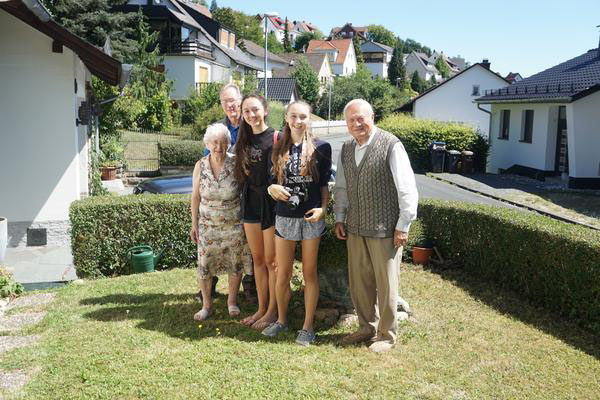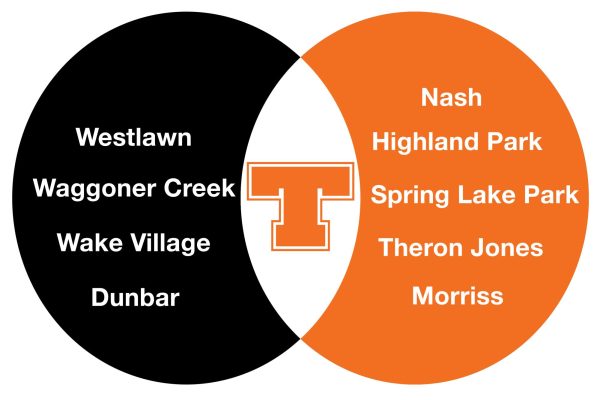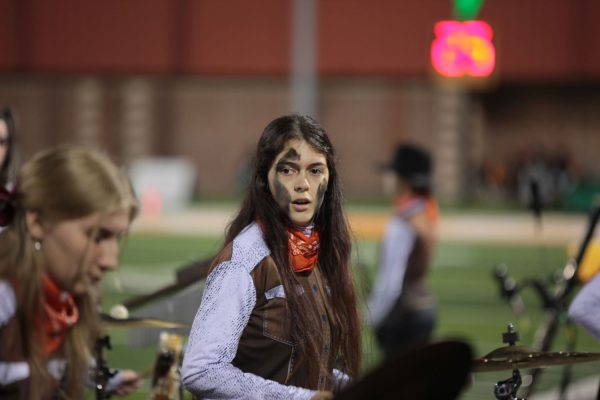Uniting cultures one goal at a time
A trip to Germany upends North American soccer misconceptions

Charli Hüter and her family pose in front of her grandparents home in Hessen, Germany. Charli visited her family this past summer.
August 20, 2018
“Goal!”
My cousin, Erich Hüter, was elated. His bright, blue eyes glittered. Not a soul in the cozy Hüter household in Frankfurt, Hessen could deny the anxious rhythm of his pitter-patter breath. My grandfather poked his thinning, cotton ball head into the room for a rare break from his daily maintenance routine, hoping to catch a good glimpse of the latest FIFA World Cup soccer match. Since Brazil’s success in 1958, the sixth staging of the FIFA-endorsed tournament, Erich had not missed a single game.
My family and I had just arrived by train to the quaint town of Herborn. We bypassed several identical communities, all boasting similar collections of half-timbered homes. Parents bumbled around in their gardens, watching kids weave across the local soccer field. “Before I even stepped foot in the Hüter’s home, I was familiar with the role that soccer played in the German lifestyle. If tradition was a paintbrush, soccer was the paint. — Charli Hüter
Erich was happy — I could tell by the sound of his feet as they tapped the floor. Since my isolation from routine English dialogue, my senses had become trained for these kinds of social cues. The only way my German relatives and I fluently understood each other was through our body language. When I couldn’t express my thoughts with the makeshift Duolingo vocabulary words I had crammed two weeks prior, I finally resigned myself to the fact that I was living the reality of a hardcore game of charades.
I assimilated a ton of useful life hacks cultivated, as of true German brew, through generations. Little did I know that upon my arrival in Frankfurt, I would become a legitimate fan of a sport that had never crossed my mind. Similar to a game of charades, it shared benefits.
Soccer, or as Erich likes to call it, ‘fussball,’ was never particularly intriguing to me. Sure, I had attended a handful of hometown matches in Texarkana, but aside from that, I believed the sport to be dwindling. One eight-hour flight later, I realized how incorrect my assumptions were. If anything, the sport was thriving. Where in the United States there may be a loose collection of teenagers organized enough for a Sunday evening football match, Germany is filled with every form of a makeshift soccer game imaginable.
This year marked the FIFA World Cup’s 50th anniversary, and, for Germany’s national football team, the potential for an addition to their four previous World Cup titles. Germany was predicted to pose a serious threat to the competition. If I were to walk along the compacted European streets of Hessen, I would be bombarded by the lively storefronts bursting with flamboyant banners and giant, inflated soccer balls. Germany’s devotion to the sport was simply infectious.
It just so happened that upon the very day that this local display of admiration took place, Erich’s worst nightmare came true. In pixelated beans across the television monitor, the red, yellow and black sea of German onlookers visibly wilted. In my peripherals, Erich’s foot halted. Gerta, Erich’s wife, trembled. I felt like an imposter for bearing witness to this insurmountable crime. Mexico had prevailed; Germany was no longer in the running for World Cup domination.
Despite my disappointingly brief relationship with the German soccer team, their untimely defeat did endow me with valuable insight on the true intent of our evening television ritual. Instead of avoiding the FIFA World Cup, Erich and Gerta encouraged its presence even more within the household. Throughout our visit, nightly rendezvous around the TV seemed to be the only time during which lingual barricades vanished. This was in tremendous thanks to the international appeal of soccer.
My trip to Germany left me with more than just a newfound intimacy with my European heritage; it instilled the universal importance of tradition, even if that tradition means discarding certain aspects of pride. I’m not ashamed to admit that, although American football also has its historical attributes, soccer will always hold a special place in the fraction of Germany I took home.



















